This leak might be a bit later than the WF-1000XM4 leak from 2 years ago, but better late than never. The photos are from a certification but I have edited and cleaned them up and removed the certification watermarks in some of them.
We can see the design is much more compact compared to the current WF-1000XM4. The model number and where it is made (China), look to be printed on the section that holds the ear tips, rather than the bottom. This might be because the underside of the earbud is no longer completely flat, most likely to facilitate a better fit in the ear. While we cannot see it in this photo, a proximity sensor will be located on the bottom, more on that later.
On the left side we can see the tactile dot which is usually located on the left unit. Above the tactile dot, there appears to be a hole for a microphone, which microphone is unknown, it is either the feedforward or voice microphone. Unfortunately this is the only view we have, so there might be more details on the other side of the earbuds.
The exterior is shinny black plastic, but this might be due to the fact this is a pre-production model and not the final production part, at least I hope so.
From the FCC filing we know for certain that a touch panel will be present on the exterior/top surface, integrated with the Bluetooth antenna. This exterior surface design might be like in the LinkBuds S, smooth with no seam.
Now turning to the charging case.
The case material also looks to be matte like the current model, but this might be pre-production material again. We do not have any ability to get a good estimate of the size but I am guessing it is smaller than the current WF-1000XM4 case.
Another major change is the recharging ability of the case. We have 5 V = 230mAh, compared to 5 V = 140mAh with the WF-1000XM4. This increase might indicate a faster recharge speed for the earbuds, which would shorter recharge times.
There does not appear to be any LED on the front inside of the case like in the WF-1000XM4, but it looks to be moved to the front. I am guessing this is what the little hole is on the front (see below).
Sticking with the case, we can see that wireless charging will be present, which is good news for users who like using a wireless pad to recharge their case and earbuds. I do wonder if the wireless recharging times have improved over the WF-1000XM4.
The certification also included some teardown photos of the case, mainly the main PCB, no battery though. We can see the wireless charging standard will be Qi again and that the battery will not be soldered to the PCB, but the wireless charging coil will be, just like in the WF-1000XM4.
The main controller is the NXP K32 L2B Microcontroller, the same as in the WF-1000XM4, except the only difference might be the flash memory size. The KL2B6V in the WF-1000XM4 has 64KB flash, where as the new WF-1000XM5 has KL2B7V, which is 128KB flash. What advantages larger flash memory will have is unknown to me.
We can also see the 2 recharging pins on the board.
Finally to the right of the USB type-C port look to be a button, similar to the one found on the LinkBuds S charging case PCB. This button is for pairing, initializing and resetting. see LinkBuds S online guide.
Next up are 2 photos of the inside of the earbuds.
We do not have the battery capacity, but we can see the battery taking up a lot of the interior space. If the battery is a standard 1254 cell, then compared to the WF-1000XM4, the new model is A LOT smaller. Bellow is a photo of the WF-1000XM4 its 1254 battery.
 |
| Sony WF-1000XM4 battery - Source 52Audio.com |
Of course the battery could be larger in size, but we will not know this until the model is released and a teardown is posted. But my gut says the battery will not be larger.
Finally the inner guts of the earbuds, the flex PCB and the System in Package.
There is a lot to unpack here, so I numbered some parts which I could make out. The System in Package is the Bluetooth module. I would imagine the metal cover needs to be removed to see the Bluetooth chip. Ok now to the list:
1. Contacts for the wireless antenna and touch sensor.
2. MEMS microphone (either voice microphone or feedforward NC)
3. Contacts for the battery most likely (update June 11th 2023)
4. Looks like another pair of contacts for a driver unit
5. Proximity sensor
6. MEMS mics (could be only for NC or also voice)
The antenna contacts look to be soldered if we go by the first internal photo, so tearing down the device could be tricky.
The yellow arrows show more chips, which are unknown. They could be a memory chip (side-A), the battery protection chip and an acceleration sensor (Side-B).
While I pointed out 2 pairs of contacts for a driver or drivers (#3 and #4), there might just be one driver and the other set of contacts is for something else (correction, the contacts are most likely for the battery). But the LinkBuds S with their one driver, only have 1 pair of contacts. If this means we will see 2 drivers in the new WF-1000XM5, is unknown, but maybe. (No we will not)
Well that is it for the reveal. I am looking forwards to the new earbuds, and I am sure a lot users will be pleased that the size has been reduced. Hopefully these will not suffer any battery issues, because replacing the batteries here looks more challenging than in the WF-1000XM4.
The place of manufacturing is now China, just like the LinkBuds S for those wondering. Anyways, what are people's thoughts? Leave them below.

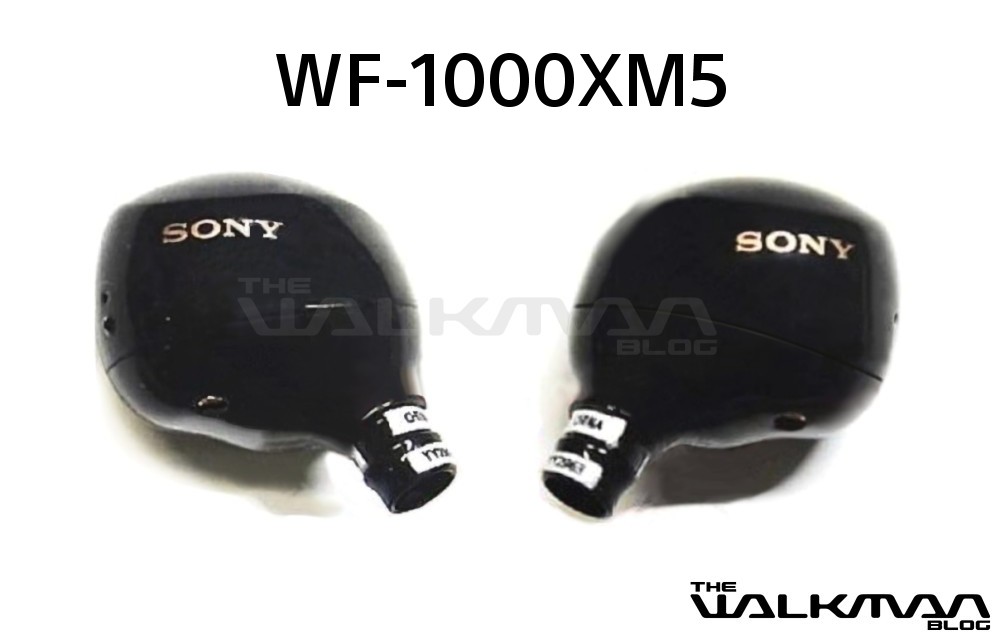


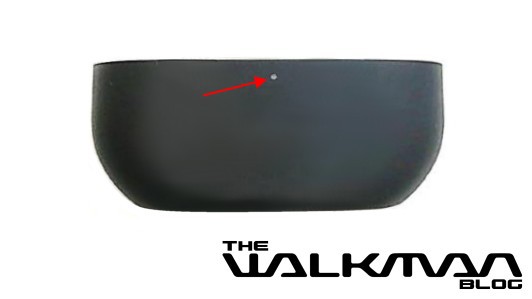
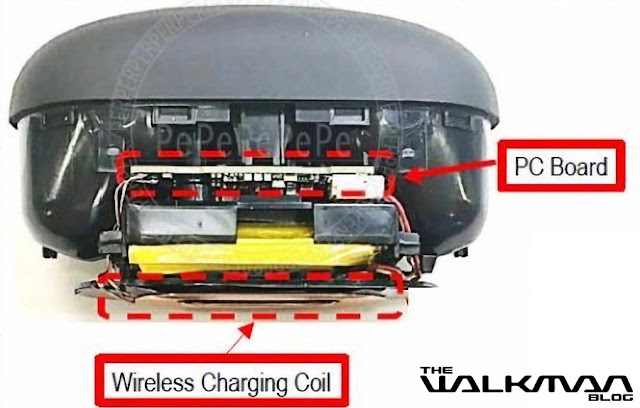
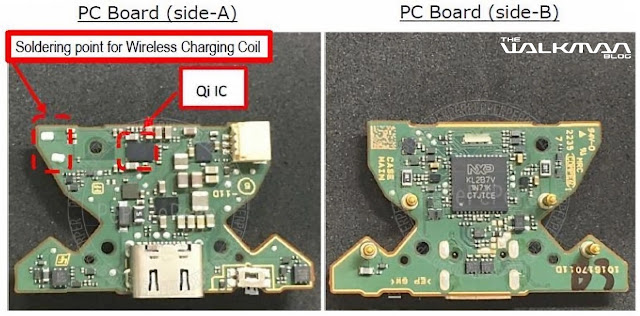
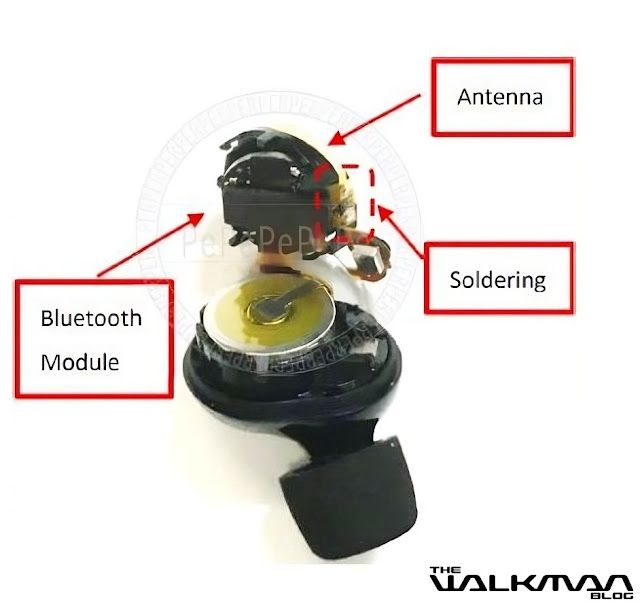

Many thanks for your finding that stuff and adding so much useful information.
ReplyDeleteI just hope a) LC3 will be supported from launch day on and we won't have to wait for an update and b) the final buds won't be glossy. That looks kinda cheap. Apart from that I really like the design and I'm sure I'll upgrade from the XM4's
E_D___B_A_N_G_E_R
LC3 isn't that great. At the same bit rate, AAC is still better than LC3 in blind tests. Of course, the best codec as of now is Opus at > 182kbps. The war on codecs is over. Any modern codec at > 128kbps are excellent.
DeleteThey would be shooting themselves in the foot if they made it glossy
DeleteComparing AAC and LC3 from a sound quality perspective (only) makes no sense because the point of LC3 is not the sound quality (apart from the claim that it's better than SBC - but anyone who wants maximum quality will chose LDAC anyway) but that it works over Bluetooth LE and has the potential to save a considerable amount of battery life - exact benefits tbc because there are no Bluetooth LE earbuds available yet.
DeleteE_D___B_A_N_G_E_R
I think I read that LC3 sounds better than SBC even at lower bitrates, like 128 or 96kbps, so when it comes to LC3 replacing SBC, I think we're in good hands.
DeleteEven SBC can sound really good at higher bitrates. On Windows you can install a certain app that enables us to choose to use LDAC or SBC (yes, LDAC on Windows 10/11). For LDAC we can choose between low/medium/high quality (330/660/990kbps) and even the sample rates that are made available to media players (so you can stream a 24/44.1 PCM stream as is to the LDAC encoder, without upsampling to 96kHz).
For SBC we can set the headphones from Stereo/Joint Stereo to Dual Channel mode - this is still Stereo, but each channel gets the max. bitpool available. So while with Stereo @ 44.1 kHz and a bitpool of 53 you will fit the audio in a 325.2kbps stream, with Dual Channel it will stream at 617.4kbps. Based on some measurements, it should make the audio at least as good as with aptX HD.
In any case, either via LDAC or SBC, this alternative BT driver really makes a difference, improving the sound quality.
I've described the app here (it's not free unfortunately, but it has a 10-day trial): https://www.mrwalkman.com/2023/03/ldac-support-windows-10-11.html
Hate glossy plastic, hope the materials are not final.
ReplyDeleteI think its sad to see that Sony is manufacturing even its highend devices in China/Vietnam etc. now.
ReplyDeleteThat means these earphones are manufactured by an OEM/ODM and not inhouse at a Sony Fab in Malaysia. Its sad to see that Sony is now going the same ways like Apple where manufacturing is always outsourced. Its also questionable now if many of these new sony products are really developed by sony or they just put their name on it, especially the lower priced devices.
The start of this outsourcing began mainly when Sony closed its main manufacturing base in Penang (Malaysia). Over 3000 workers lost their job then.
Great to see some news about the xm5. Happy with the xm4 performance, not had any issues with it at all, so any advancements or improvements in any dept would be very welcome!
ReplyDeleteI'm a big fan of the wf-xm4, I liked that they were made in Malaysia. Making the wf-xm5 in PRC frees me to choose from the multitude of other available TWS that are made there.
ReplyDeleteSo you only chose Sony buds before because they were not made in China? Is that all there is about Sony buds, where they're made? :)
DeleteI also tend to buy from brands that aren't made in China. They usually have a better build quality and use better metals.
DeleteI choose them and Sony IEMs because I love how they sound and their quality, I'm also just generally fond of Sony products. I liked that the wf-xm4 were made in Malaysia, I prefer to buy goods made outside PRC, buying clothing and footwear is easy enough but it is difficult to find consumer electronics that aren't made there.
DeleteI think that Sony cares about their products, so they would make sure that their products are made right. After all it's a piece of hardware that will have to sit in people's ears. Combine this with their software, which includes ANC and even their sound, they usually have interesting results. I've personally used the WH1000XM2/3/5, and the WF1000XM3/4. I love that the WHXM5 and WFXM4 don't have the same boomy bass as their previous iterations.
DeleteI wonder what driver they used this time, 6mm or 5mm? Something new?
ReplyDeleteIt would be awesome if it had 2 drivers.
DeleteI am only guessing the double drivers since there are 2 pairs of contacts, and they both have leads going to them. I could be wrong.
DeleteThink it will have LE audio?
ReplyDeleteI think so.
DeleteGreat article, thanks!
ReplyDeleteMy guess is that the larger flash memory is for larger machine learning models for equalizer modes, background noise, voice clarity, and wind filters
valid point
DeleteI’m okay with that piano black look if plastic is high quality. Also it would be nice that chrome Sony logo.
ReplyDeleteThere are many Hi-Res and Ldac supported Headphones on the market. They are good or bad, each on their own platform. In my opinion, Sony should raise the bar a lot when it comes to sound quality. People now want some software innovations rather than better sound. Sony is one of the pioneers of this. It would be great if it was small in design and it would fit in the ear much better. because it was Big in XM4 and I had a feeling that it would fall at any moment. In my opinion, the biggest reason to look for a headset should be Sound quality and Comfort. Battery, charging time etc. should be later. first The sound quality should be very very good , because we buy them to listen to music.
ReplyDeleteAnnouncement on WF-1000XM5 - June 5th - 9th.
ReplyDeleteThat was a poor guess
Delete